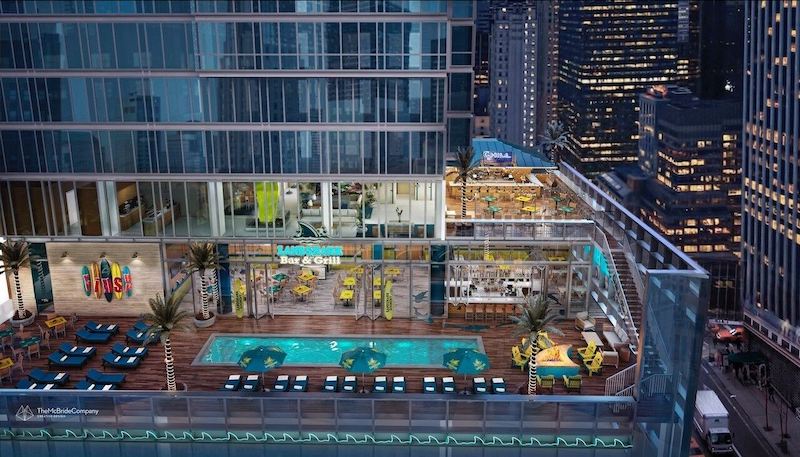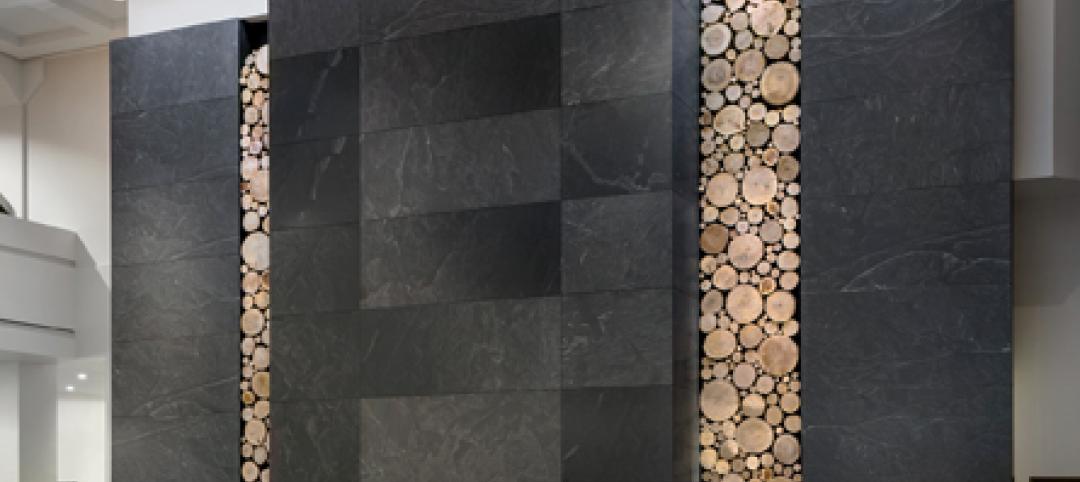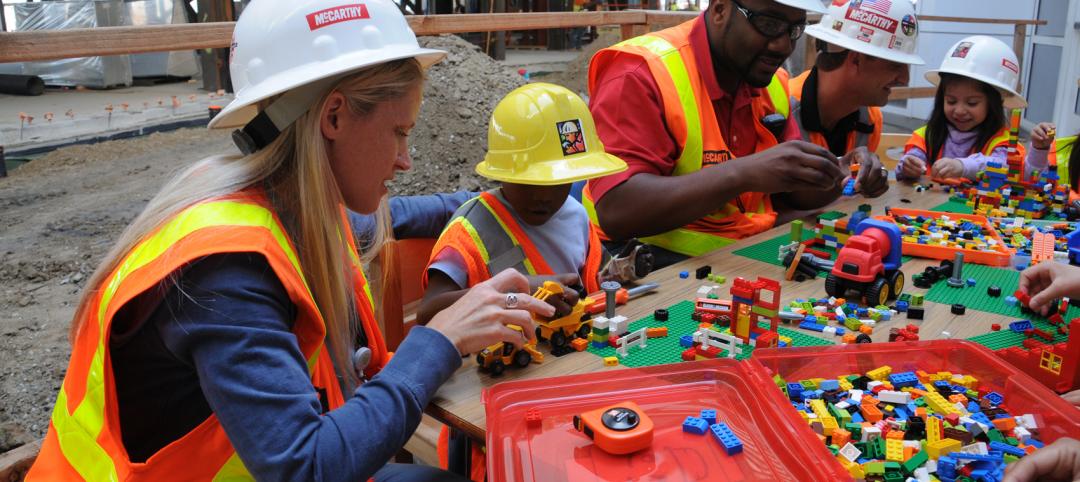There are many beaches in New York City, including Jones Beach State Park, Coney Island, Manhattan Beach, Brighton Beach, The People’s Beach at Jacob Riis Park, Times Square …
Wait. What?
Surrounded by buildings, asphalt, concrete, and enough exterior lighting to throw off anyone’s circadian rhythm, Times Square is rarely mistaken as a place to go for relaxation. But a team of developers led by Margaritaville Hospitality Group and Soho Properties is marketing the newly opened Margaritaville Resort Times Square, located at 7th Avenue and 40th Street, as a vertical version of a vacation getaway.
This is the first of 22 Margaritaville lodging venues that isn’t horizontal. The $370 million, 32-story hotel, rising 375 ft above street level, offers 234 rooms and five restaurants. To give the hotel its resort feel, the developers brought in The McBride Company as its interior designer. McBride has done the interiors for numerous other Margaritaville venues.
Outside one of the hotel’s restaurants, the Landshark Bar & Grill, is Times Square’s only heated year-round outdoor pool. And the building’s architectural design, by the firm Stonehill Taylor, maximizes guests’ and visitors’ views of the city.
“We don’t have a beach, but we have Times Square,” says Paul Taylor, President and Founding Partner at Stonehill Taylor, whom BD+C interviewed with the firm’s Senior Associate Steve Chew.
HOTEL SITS IN TWO ZONING AREAS
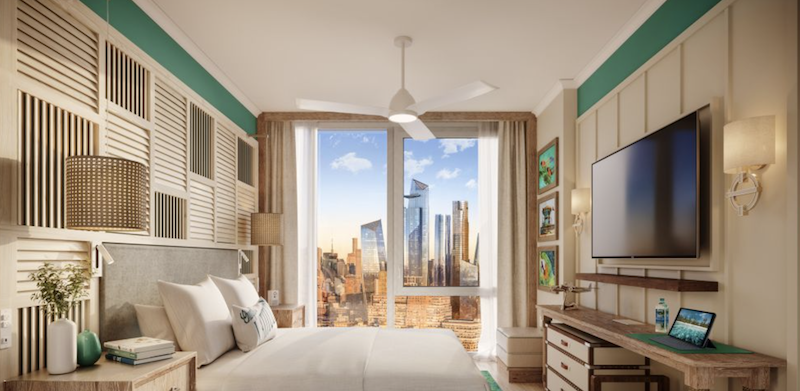
The views from the hotel's 234 rooms maximize the cityscape. Image: Margaritaville Resort
Stonehill Taylor has been involved in at least 70 hotel projects in New York since the firm’s founding in 1986. Its design of the Margaritaville Resort began in 2014, and construction, by Flintlock Construction Services, commenced three years later.
Other building team members on this hotel project included WSP (SE and MEP), Frank Seta & Associates (façade), Jenkins & Huntington (elevator), URS (civil/geotech), and Longman Linsey (acoustics). The project's construction cost was $98 million.
The Margaritaville Resort posed some unique challenges. For one thing, the hotel—which replaces a six-story building that housed the former campus for the Parsons School of Design and a synagogue—sits between two zoning districts, so the hotel’s exterior lighting is limited, explains Chew. (Reveal Design Group was the lighting provider on this project.) In addition, the real estate footprint for this building is relatively small—9,886 sf.
To call attention to the hotel, the team incorporated a 32-ft-tall replica of the Statue of Liberty (hoisting a margarita glass, of course) into the building’s design. A five-story stairwell (an improvisation to offset some setback and street wall requirements) allows pedestrians to see up to the pool and deck on the fourth floor. The hotel’s rooftop, and several of its rooms, give guests and visitors a perfect view of the New Year’s Eve ball dropping.
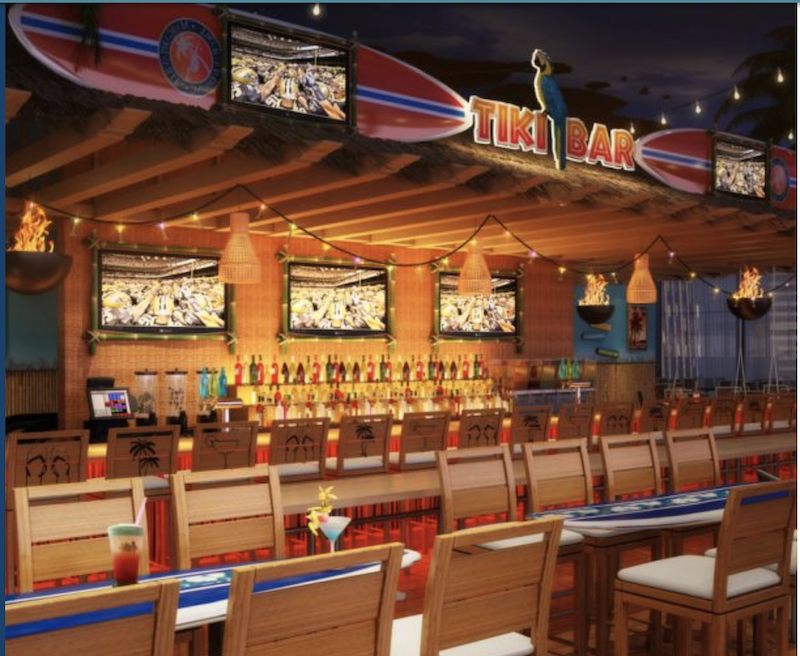
The hotel has one of the city's largest food & beverage operations. Image: Margaritaville Resort
Taylor notes that the building team completed this project during the coronavirus pandemic and restrictive COVID-19 jobsite protocols. “This was a new experience for us,” he says. Taylor adds that none of the hotel’s five restaurants are on its first floor, bucking what had been conventional wisdom about where hotel food and beverage venues needed to be located to be successful.
Margaritaville Resort includes nearly 5,000 sf of retail space. The ground-floor retail features 22-ft-tall ceilings. (IMCMV Holdings is the developer for the hotel’s retail and F&B spaces.) The hotel’s first floor is also the entrance to a replacement synagogue (whose reconstruction was part of the property acquisition deal) that is located on two below-street level floors.
Margaritaville Resort Times Square opened at a time when, as reported in the New York Post, the city’s Office of Nightlife has proposed creating 24-hour “entertainment districts” that would open up certain neighborhoods, possibly including Times Square, for 24/7 revelry that could contribute to the hotel’s resort atmosphere.
Related Stories
| Feb 3, 2013
Electronic surveying improves accuracy on BIM-driven hospital project
A mechanical contractor combines an electronic surveying tool with a BIM model to make significant productivity gains in a large-scale hospital project.
| Jan 31, 2013
Map of U.S. illustrates planning times for commercial construction
Stephen Oliner, a UCLA professor doing research for the Federal Reserve Board, has made the first-ever estimate of planning times for commercial construction across the United States.
| Jan 31, 2013
More severe wind storms should prompt nationwide reexamination of building codes, says insurance expert
The increased number and severity of storms with high winds nationally should prompt a reexamination of building codes in every community, says Mory Katz, vice president, Verisk Insurance Solutions Commercial Property, Jersey City, N.J.
| Nov 11, 2012
Greenbuild 2012 Report: Hospitality
Hotel boom signals good news for greener lodging facilities
| Aug 9, 2012
DSGW Architects welcomes new employees
Three new employees located in DSGW's Duluth office.
| Jul 20, 2012
2012 Giants 300 Special Report
Ranking the leading firms in Architecture, Engineering, and Construction.
| Jun 13, 2012
Is it time to stop building convention centers?
Over the last 20 years, convention space in the United States has increased by 50%; since 2005, 44 new convention spaces have been planned or constructed in this country alone.
| Jun 1, 2012
New BD+C University Course on Insulated Metal Panels available
By completing this course, you earn 1.0 HSW/SD AIA Learning Units.
| May 31, 2012
5 military construction trends
Defense spending may be down somewhat, but there’s still plenty of project dollars out there if you know where to look.
| May 29, 2012
Torrance Memorial Medical Center’s pediatric burn patients create their version of new Patient Tower using Legos
McCarthy workers joined the patients, donning construction gear and hard hats, to help with their building efforts.


